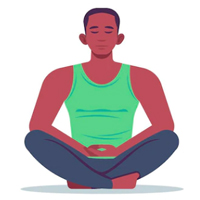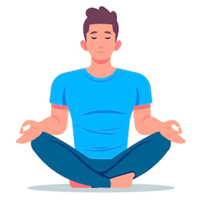Save 25% On Your First Autoship Order
Save 25% On Your First Autoship Order

Before I became a respiratory therapist, I thought that I knew how to breathe. I guess I just took it for granted that you inhale and exhale and that’s it. But it turns out that there are many breathing techniques that can help in various situations (i.e., stress, shortness of breath, and anxiety.) I will discuss just a few breathing techniques that we employ for our lung impaired patients, and some techniques that are used to help with stress or anxiety.
In the western world, we don’t breathe properly. We are a bunch of “shallow breathers” who quickly go about our business to get to the next task. The total lung capacity of an adult male is approximately 6 liters of air (the size of three large soda bottles). But when we breathe, on average we only take in about 0.5 liters of air each breath, and for people with impaired lungs, it is even less. When we are stressed or short of breath, we tend to pant or take shallow breaths. This does not allow the full amount of oxygen to enter the bloodstream (hyperbaric oxygen therapy at home) and it causes us to blow off too much of our carbon dioxide.
This is a breathing technique that is taught to every patient who is diagnosed with lung disease and becomes short of breath. It can be used by anyone at any time and is employed by weightlifters and bodybuilders routinely. The premise of this technique is that by “pursing” the lips, you create a back pressure in the airway keeping it from prematurely collapsing down on exhalation. To do this maneuver, the patient is instructed to breathe in deeply through the nose only and exhale through pursed lips. This also helps to slow breathing down and keep carbon dioxide from being expelled too quickly. It also allows oxygen time to be absorbed into the bloodstream.



Also called “belly breathing”, this technique is employing the diaphragm instead of the rib and neck muscles to do the work of breathing. Our diaphragm is a dome-shaped muscle that pulls down on the lungs to fill them and pushes upon them to empty them. People who suffer from lung disease have damaged diaphragms. Either the diaphragm is no longer functioning as it used to because of “over-inflation” of the lungs pushing down on the muscle making it flat instead of dome-shaped or the nerve that innervates it is impaired. To perform diaphragmatic breathing, it is recommended that the patient sit comfortably and place a hand on the belly. When inhaling through the nose, the belly should rise and exhalation should be done through the mouth for twice as long as inhalation. Not only does this help to fill and empty the lungs properly, but it is also a form of mindful breathing and can help with anxiety and stress.



This is an excellent and easy way to practice mindful breathing. Simply put, you breathe in slowly through the nose for a full four seconds, hold that breath in for 7 seconds, and slowly, slowly exhale for a total of 8 seconds. It helps to slow down breathing and the absorption of oxygen. It also helps to slowly expel carbon dioxide from the lungs. I am a practitioner of this technique and it has been a fantastic way for me to decrease stress and anxiety.
Breathing techniques are important for energy conservation as well as for overall well-being. If you suffer from breathing issues or are short of breath with certain activities of daily living, try to use an alternative way to breathe so that you can be more comfortable when you are active. None of these techniques are dangerous. You can perform them anywhere at any time to help overcome some of your breathing obstacles.
Author Profile: Laura Castricone, Respiratory Therapist
![]()
My name is Laura Castricone and I am a Certified Respiratory Therapist. I have been practicing in the state of Connecticut since 1992. I have worked in several aspects of respiratory care including sleep medicine, critical care, rehab, and home care. I earned my respiratory certification at Quinnipiac University in Hamden, CT. Prior to becoming an RT, I attended the University of Connecticut pursuing a degree in English but left Uconn in my junior year to work with my father in the restaurant business. I stayed with him for over a dozen years. An education, by the way, that can never be bought! Once I married and had children, the restaurant business no longer fit my lifestyle. When my children were one and two years old, I decided to go back to school and that is where my career in respiratory care began. This career has been very rewarding and I have been blessed to meet some extraordinary people along the way. I grew up in Waterbury, CT, and now live in Litchfield County, CT with my husband and our crazy Jack Russell terrier, Hendrix. My hobbies include antiquing, gardening, writing plays, and painting miniature paintings.
Disclaimer: All content found on our website, including images, videos, infographics and text were created solely for informational purposes. Our content should never be used for the purpose of diagnosis or treatment of any medical conditions. Content shared on our websites is not meant to be used as a substitute for advice from a certified medical professional. Reliance on the information provided on our website as a basis for patient treatment is solely at your own risk. We urge all our customers to always consult a physician or a certified medical professional before trying or using a new medical product.

![]() My name is Laura Castricone and I am a Certified Respiratory Therapist. I have been practicing in the state of Connecticut since 1992. I have worked in several aspects of respiratory ...
My name is Laura Castricone and I am a Certified Respiratory Therapist. I have been practicing in the state of Connecticut since 1992. I have worked in several aspects of respiratory ...
How To Increase Iron Levels Quickly
It’s a question that must have puzzled you like many others. Iron is essential in hemoglobin production and its inadequate levels can negatively impact your health. Dive into this informative article to explore top iron-rich foods that can help you fight iron deficiency.
10 Best Coccyx Cushions for Tailbone Pain
If you're like most people, you spend about 8 to 10 hours sitting every day. However unhealthy, it is part of life for many, and can cause tailbone pain. Coccyx cushions can help alleviate this pain. Click to read more and find the perfect coccyx cushion for your tailbone pain.
5+ Best Adult Diapers for Fecal Incontinence
Dealing with fecal incontinence can be challenging, but you're not alone. Read this article and navigate through discreet and effective solutions that help you manage fecal incontinence and let you live life on your terms with confidence and comfort.
Top 5 Best Reviewed Nebulizers of 2024
Need an effective and affordable nebulizer? Look no further, in this article we offer 5 of our best reviewed nebulizers that are loved by our customers. Click to read more and find the perfect nebulizer for all your respiratory needs.
10 Best Penis Pumps For Erectile Dysfunction
For anyone dealing with erectile dysfunction, penis pumps serve as a great way to manage it. But with so many products available, determining the best one for your needs can be challenging. To assist you in refining your choices and making an informed decision, here are our top 10 options, recognized for their effectiveness and safety.